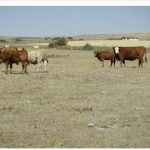Street kids in West African communities are at the mercy of their society.
Child labor, stealing, begging and prostitution are all problems common to children living in developing countries. Part of the problem is lack of education, but one aid group is working to change that.
Jean-Philippe Murillo, the West African director of Save The Children, is communicating that message to schools and groups in Saskatchewan and Alberta this month.
Murillo is in Canada for the annual Save The Children conference in Orillia, Ont., and is using this time to drum up support to continue his efforts in Burkina Faso and Mali.
Read Also

Land crash warning rejected
A technical analyst believes that Saskatchewan land values could be due for a correction, but land owners and FCC say supply/demand fundamentals drive land prices – not mathematical models
“The children are our primary objective and all our programs are focused on them,” he said. “When you are talking about children, you are talking about children’s rights, health, education, protection and work.”
Murillo, who has been working in developing countries for the past 20 years with the Canadian International Development Agency, ensures the help he receives from Canada is effective.
With help from Canadians, West African communities have been able to build schoolhouses, train instructors and dig wells.
“The most important programs we have are educational programs. We have, after last year, seven (educational) centres and 650 people who can read and write,” Murillo said.
Most schools have classes for 35 students during the day and an equal number of adults in the late afternoon. The students who attend receive basic literary instruction while the adults learn trades.
“The people who are very keen are going to learn about agriculture, raising chickens, cows and pigs.
“After that, they are going to put it in practice and learn a little bit more about agriculture because they have a possibility to grow … more rice, corn, peanuts or millet.”
Trained people make their communities more self-sufficient, which is crucial in a country with a three-month growing season, Murillo said.
Aid workers also help mothers in the villages by teaching them basic child care, along with vaccination, nutrition and health. But even with their efforts, many problems continue to grow.
As Murillo walks along the streets of Ouagadougou, Burkina Faso, and other West African communities, he encounters hundreds of children, begging for food and money, working like slaves for foreign companies and selling themselves for basic needs.
“The children in the villages have nothing to do so they think when they go to the towns they are going to have work (or) relatives that can feed them and send them to school, and that is not true.”
Murillo said he sees girls as young as 12 walking the streets selling themselves and with the threat of AIDS in developing countries, that worries him. He estimates that during the last two years, the number of people infected with AIDS in the communities has risen 300 percent.
The organization has developed programs and increased awareness of the disease. Information, along with safety measures, proper medical training and health care in hospitals are all areas Murillo is working on but he said more help is needed.
















